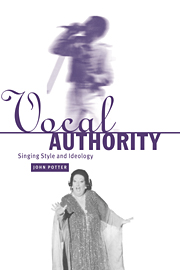Book contents
- Frontmatter
- Contents
- Preface
- Acknowledgements
- Chapter 1 Classical ideology and the pre-history of singing
- Chapter 2 The medieval period: religion, literacy and control
- Chapter 3 The Italian baroque revolution
- Chapter 4 The development of the modern voice
- Chapter 5 Concerts, choirs and music halls
- Chapter 6 Armstrong to Sinatra: swing and sub–text
- Chapter 7 Early music and the avant-garde: twentieth-century fragmentation
- Chapter 8 Elvis Presley to rap: moments of change since the forties
- Chapter 9 Singing and social processes
- Chapter 10 Towards a theory of vocal style
- Notes
- List of references
- Index
Chapter 7 - Early music and the avant-garde: twentieth-century fragmentation
Published online by Cambridge University Press: 22 September 2009
- Frontmatter
- Contents
- Preface
- Acknowledgements
- Chapter 1 Classical ideology and the pre-history of singing
- Chapter 2 The medieval period: religion, literacy and control
- Chapter 3 The Italian baroque revolution
- Chapter 4 The development of the modern voice
- Chapter 5 Concerts, choirs and music halls
- Chapter 6 Armstrong to Sinatra: swing and sub–text
- Chapter 7 Early music and the avant-garde: twentieth-century fragmentation
- Chapter 8 Elvis Presley to rap: moments of change since the forties
- Chapter 9 Singing and social processes
- Chapter 10 Towards a theory of vocal style
- Notes
- List of references
- Index
Summary
There is a common-sense view of music history which says that until Mendelssohn ‘rediscovered’ Bach all music was contemporary music, which was then discarded in favour of more contemporary music. In fact, the idea of performing music from previous generations is as old as music history itself. The chant repertoires codified by Gregory into the corpus that (rightly or wrongly) bears his name are an early example; the Prague manuscript known as the Codex Speciálník, which dates from around 1500 and contains French Ars Nova pieces as well as Franco-Flemish polyphony, is inscribed with a presentation date of 1611; Monteverdi is known to have ordered copies of Josquin's masses for his singers; Hawkins and Burney, compilers of eighteenth-century musical histories, had an academic interest in earlier music; Bach performed Palestrina at Leipzig and the Academy of Ancient Music in nineteenth-century London promoted concerts of Handel and Purcell, among others. In the early twentieth century, Landowska and Dolmetsch were responsible for re-kindling interest in historical instruments, and Nadia Boulanger performed Monteverdi's madrigals. Since the beginning of the century scholars have made performing editions of medieval and Renaissance music. Until recently, however, the singing style adopted for the performance of pre-Romantic music was invariably that of current post-Romantic practice, with no concession to the idea that the music may have sounded completely different when it was first performed.
- Type
- Chapter
- Information
- Vocal AuthoritySinging Style and Ideology, pp. 113 - 132Publisher: Cambridge University PressPrint publication year: 1998

